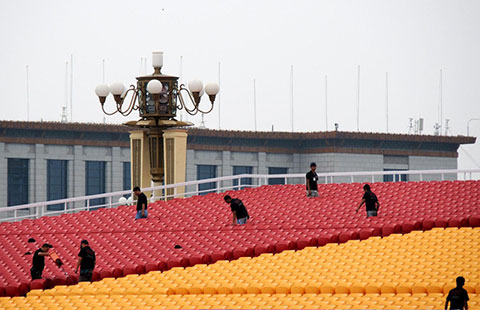Guangzhou homes await place in the sun
Updated: 2015-08-21 14:17
By Zhou Mo(China Daily USA)
|
||||||||
|
The overall property market of Guangzhou appears to be suffering the effects of a lower competitive edge, which has seen investors choose to take their money to other first-tier cities with booming real estate sectors or, as earlier this year, to the stock market. Provided to China Daily |
Shenzhen is seeing exponential rise in home prices while Guangzhou, barely 90 minutes away by train, seems to be still languishing in the shadows. But all that may change soon. Zhou Mo reports.
Last June, as Shenzhen "celebrated" its victory in the mainland's "championship" of monthly home-price growth rate sfor seven months consecutively, about 150 kilometers to the northwest, in Guangzhou, the picture was very different.
After three months of declining prices since March, the housing market in the Guangdong capital finally saw a reversal in June. According to the Guangzhou Municipal Land Resources and Housing Administrative Bureau, average price for new private housing in June rose 6.6 percent monthly, from 14,232 yuan ($2,225) per square meter in May to 15,177 yuan per square meter.
However, despite the increase, that price tag was still only half the average in Shenzhen, which recorded 30,713 yuan per square meter in June, according to data from the Urban Planning Land and Resource Commission of Shenzhen Municipality.
On a larger scale, home prices in Guangzhou are also not on the same level as the other two first-tier cities. Data from E-House China R&D Institute, a Shanghai-based property research organization, show that average price for new private housing in June was 30,022 yuan per square meter in Beijing and 34,191 yuan per square meter in Shanghai.
It seems implausible and incomprehensible to many people that home prices in the southern political, economic and cultural center deviate so markedly from the average level of first-tier cities. But the change of jurisdiction in some parts of Guangzhou may partly explain the situation.
"Average home prices in Guangzhou have been lowered by the inclusion of Zengcheng and Conghua in the calculation," pointed out Carlby Xie, head of research at US-headquartered real estate consultancy Colliers International (China).
Zengcheng and Conghua, once cities in Guangdong in their own right, have now been reallocated as districts of Guangzhou.
Home prices in the two newly established districts have stayed at a low level compared with the rest, especially the six central ones of Yuexiu, Haizhu, Liwan, Tianhe, Baiyun and Huangpu.
According to the Guangzhou bureau, average price for new homes in the six central districts was about 30,009 yuan per square meter in June, with Yuexiu district leading at 43,914 yuan per square meter, compared with just 9,585 yuan in Zengcheng and 8,078 yuan in Conghua.
Low investment sentiment and excessive development over the past few years are two other factors behind the phenomenon, Xie noted. "Unlike Shenzhen, Guangzhou's property market has been tepid. There aren't that many property investors there. Most homebuyers in Guangzhou are end users rather than making a purchase for investment. Moreover, a large housing supply also curbs the space for price growth," he said.
Gap of luxury
The price gap between Guangzhou and its peer cities is also reflected in luxury apartments. According to a recent report by E-House, the second quarter recorded 79 luxury residential projects priced above 60,000 yuan per square meter in four first-tier cities.
Of these, Shanghai accounted for more than a half, with the highest price almost reaching 200,000 yuan per square meter. Beijing came next, with 34 percent of homes at that level, while Shenzhen ranked third with 11 percent. Guangzhou, meanwhile, had only two such projects, with average transaction price below 90,000 yuan per square meter.
Yan Yuejin, director of research at E-House China in Shanghai, said the big price difference between Guangzhou and its peer cities owes something to its demographic structure. "The wealthy group is relatively larger in Beijing and Shanghai, compared with that in Guangzhou. Those people have stronger ability to afford apartments in high-end residential projects," said Yan.
On March 30, the central bank introduced a new housing policy aimed at boosting the mainland's gloomy property market.
According to the policy, individuals who have already paid off the mortgage for their first homes can enjoy a down payment ratio of as low as 30 percent when making a second purchase.
Those who have not are entitled to a down-payment ratio of at least 40 percent.
Since the introduction of the policy, housing prices in Shenzhen have seen a dramatic surge.
According to the National Bureau of Statistics, average price for new homes jumped 7.2 percent in June on a monthly basis, the highest growth among 70 major and medium-sized mainland cities.
By comparison, the Guangzhou property market seemed less affected by the new policy.
Peng Peng, senior researcher at the Guangzhou Academy of Social Sciences, believes the weak policy effect is mainly the result of oversupply and capital transfer to the then-booming stock market.
"Property supply in Guangzhou is relatively large. Also, the buoyant stock market earlier this year spurred some people to transfer their money from the real estate industry to the capital market," analyzed Peng. Some other analysts linked the situation to the city's competitive edge, saying that Guangzhou's relatively low competitiveness has made investors plow their money into other first-tier cities.
Late bloomer
Guangzhou used to be a leading city in South China but has now been overshadowed by Shenzhen. Compared with Beijing, the country's political, economic and cultural center, international financial hub Shanghai, and Shenzhen, which is developing fast and wields significant innovative clout, many think Guangzhou is lagging behind.
The competition between Guangzhou and Shenzhen, in particular, is at the heart of the discussion.
Speaking at a press conference last month, Guangzhou Mayor Chen Jianhua said Shenzhen sets a good example for his city and that Guangzhou will learn from it.
"Guangzhou had once been a leading city in the country's development. But now, it is being outshone by Shenzhen and has lost its halo," Carlby Xie at Colliers International (China) said.
But his overall attitude toward the city's property market is still positive. "Housing prices in Guangzhou are expected to remain stable, as it has stable demand. There are, of course, areas that have room for price growth, but that would take time," Xie reckoned.
Contact the writer at sally@chinadailyhk.com


- Tsipras formally resigns, requesting snap general elections
- China-Russia drill not targeting 3rd party
- UK, France boost security
- China demands Japan face history after Abe's wife visits Yasukuni Shrine
- DPRK deploys more fire units to frontlines with ROK
- DPRK, ROK trade artillery, rocket fire at border

 Giant panda Bao Bao celebrates two-year birthday
Giant panda Bao Bao celebrates two-year birthday
 Across America over the week (Aug 14 - Aug 20)
Across America over the week (Aug 14 - Aug 20)
 Stars in their eyes: leaders in love
Stars in their eyes: leaders in love
 A survival guide for singles on Chinese Valentine’s Day
A survival guide for singles on Chinese Valentine’s Day
 Beijing police publishes cartoon images of residents who tip off police
Beijing police publishes cartoon images of residents who tip off police
 Rare brown panda grows up in NW China
Rare brown panda grows up in NW China
 Putin rides to bottom of Black Sea
Putin rides to bottom of Black Sea
 The changing looks of Beijing before V Day parade
The changing looks of Beijing before V Day parade
Most Viewed
Editor's Picks

|

|

|

|

|

|
Today's Top News
China advocates practical cooperation between LatAm, East Asia
Giant panda gives birth at Washington's National Zoo
Emissions data won't change China policy
Preparations shutter Forbidden City, other major tourist spots
President Xi Jinping calls for crews not to ease up
Chemical plants to be relocated in blast zone
Asian sprinters on track to make some big strides
Jon Bon Jovi sings in Mandarin for Chinese Valentine's Day
US Weekly

|

|







